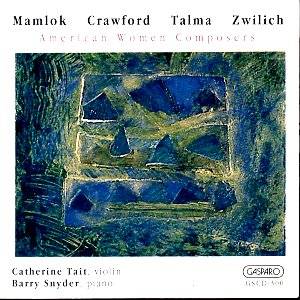This is something of
a tough, though not unrewarding, listen.
It charts a particular strain of twentieth
century American violin music or, to
be more accurate, violin music written
in America by women composers and much
of it is stern and some of it is unyielding.
Ursula Mamlok was born in Berlin and
arrived in America in the early 1940s
where she studied with George Szell
and later Roger Sessions and Stefan
Wolpe. Her 1988 Sonata was written for
Catherine Tait, the instigator of the
whole disc, and is a concise three-movement
work. Though Mamlok embeds a little
abstract cradlesong – inspired by the
birth of Tait’s child – what one most
recalls of the sonata is the rather
austere and cerebral restraint of the
opening movement marked With fluctuating
tension. From My Garden (1983)
is serial – and still – and Designs,
much the earliest of the trio of her
works recorded here, is in turn angular
and jagged and in the Capriccioso second
movement, frantic. She’s more rewarding
when introspective than motoric and
abrasive.
Louise Talma was French-born,
in Arcachon in 1906 and she too came
to America when young, studying music
history with Charles Seeger and composition
with Nadia Boulanger for many years.
She has written two textbooks in addition
to her numerous compositions. Her 1962
single movement sonata is multi-sectional
and was written for Boulanger on her
65th birthday. Moving through
rhythmic and emotive stages there are
moments of rippling momentum as of elegiac
intensity; most impressive are the veiled
hints of nostalgia and Tait’s broadening
and quickening vibrato in response to
the deeper journeying of the music.
There’s elfin drama and a most sensitive
coda. I found it by far the most sympathetic
work on the disc.
Ellen Taaffe Zwilich’s
Sonata in Three Movements was composed
during 1973-74. Zwilich was born in
Miami and was the first woman to win
a Pulitzer Prize in music - in 1983
for her Symphony No 1. A student of
Elliott Carter and Roger Sessions she
also studied the violin under the famous
pedagogue Ivan Galamian, later playing
in the American Symphony Orchestra under
Stokowski. Lasting about nine minutes
the sonata is an attractive work with
a particularly kinetic, brittle and
pizzicato-aerated drive in the finale.
Ruth Crawford, known to some as Crawford
Seeger, is represented by her tough
and sinewy 1926 sonata. It’s full of
dissonance in the opening movement and
a wayward Scriabin influence haunts
the third – marked Mistico – full of
complex unease. There’s certainly nothing
easy or restful about the rhetoric and
little that’s immediately likeable,
if that’s your measure of its success.
The performances are
as committed as Tait’s own sleeve notes
(which are helpful and full), and Barry
Snyder is an understanding accompanist.
I’ve been searching for a glib adjective
to sum up the disc and have decided
on "bracing".
Jonathan Woolf
The
entire Gasparo Catalogue may now be
purchased through MusicWeb
